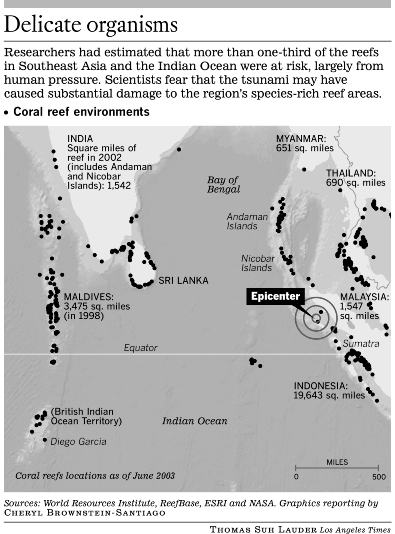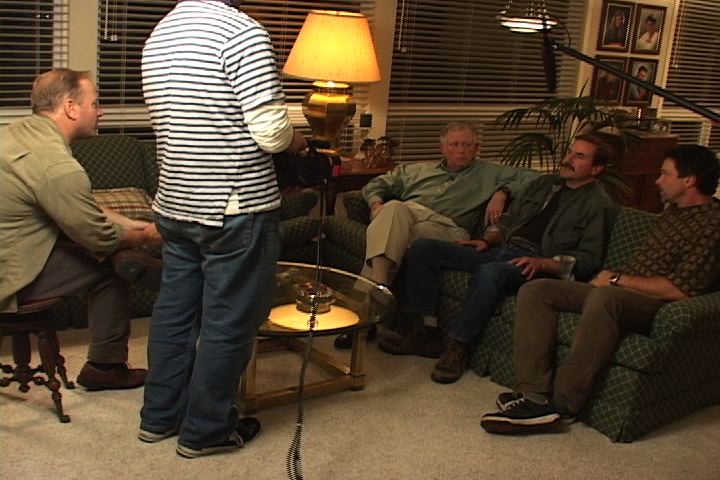January 31, 2005
1/31 - A Film About the "not monsterously polarized" Issue of Marine Reserves in Oregon ...
There's a new half hour film about marine reserves in Oregon titled, "Oregon Ocean: Common Ground." A review of the film says:
The issue is one of the most controversial in the Northwest yet, unlike the region's timber wars, it is not a monstrously polarized one.
Not "monstrously polarized"? Gee, that's nice. The writer must be talking about a different fishing community than the six fishermen's website I've spent time on in the past month.
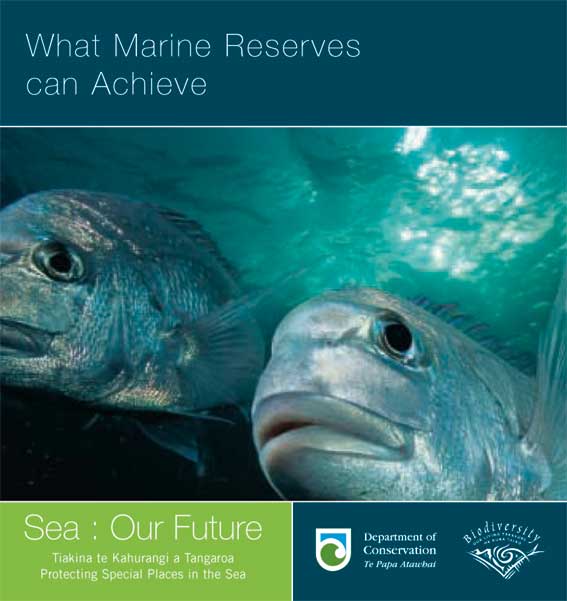
Marine Reserves: An issue that's "not monstrously polarized"?
January 29, 2005
1/29 - Blah: We Hate You, Hollywood Celebrities!
Every few weeks I get an angry fisherman letter that takes a swipe at us for using "ass face Hollywood celebrities" (as one writer so eloquently put it). All I can say is it sure does work. Our Ocean Symphony PSA has probably played over 20,000 times across the country (we stopped counting at just past 13,000 in March, 2004 when our distribution deal ended, but we still get plenty of e-mails from people saying they have seen it air).
By the way, for anyone who is interested, we have never paid for any air time for the PSAs. Instead what we do is hire a distributor who duplicates, packages, and ships out the PSA to television stations. All stations are required by the government to do a certain number of hours of free "public service programming" each week. The fact is that most of that time is during the middle of the night (12-6), but definitely not all and it probably depends on how much they like your PSA. In our case, CNN ran the Ocean Symphony several times nationally on Headline News during prime time in Dec., 2003 that shot our web traffic through the roof.
The tapes sent out have Nielsen tracking codes which result in monthly reports showing us every time and place the PSA has aired. We had the Ocean Symphony sent to 1000 stations across the country. The Tiny Fish went only to 70 stations in California, of which 43 reviewed it and about 25 have aired it.
Anyhow, apparently there are some people in this country who aren't as keen on the use of Hollywood celebrities. Though I bet if they could recruit some Hollywood celebrities of their own they would find it easier to get their message of hating Hollywood celebrities out.

Hollywood Celebrities: Why do they love to hate them?
1/28 - Respek Da Reefs: Tsunami tragically shows the value of healthy coral reefs
The tsunami did more damage to islands that did not have healthy coral reefs and mangroves.
It's pretty much common sense. Coral reefs are underwater structures which inevitably get in the way of an arriving tsunami and reduce its impact. The islands in the Indian Ocean that had destroyed their coral reefs through dynamite fishing and other destructive practices were lacking these structures. They paid a greater price than necessary.
Here's an article that tries to make comparisons between islands with and without healthy coral reefs, which is really pretty difficult scientifically given all the variables of bottom topography, distance and orientation from the epicenter. But regardless, destroying coral reefs removes a protective barrier, and building houses over mangroves puts you in the cross hairs of the approaching tsunami.
Just a lot of sad common sense.

Coral Reefs are Your Friends: treat them well and they will help protect you from tsunamis.
January 27, 2005
1/27 - Take That, Dr. Crichton: British study doubles global warming alarm
Just when Michael Crichton thought he was revealing that the global warming emperor has no clothes, it turns out the emperor is wearing a parka (and sweating).
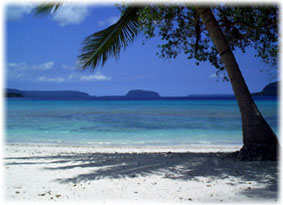
British think Antarctica may someday look like this.
January 26, 2005
1/ 26 - Oceana Targets "Nasty 9" Chlorine Plants as Source of Mercury in Fish
Oceana announced today they are making chlorine plants one of their top three priority projects. They have identified their "Nasty Nine" -- the nine worst mercury emitting chlorine plants in the country. There are lots of ominous statistics around the industry. Chlorine plants were first created in 1894 and produced high levels of mercury emissions. New technology has cleaned up the industry, but these 9 plants continue to use the old procedures which are bad news. Oceana plans to put the squeeze on them.
To learn the details, check out the Oceana web pages about mercury and chlorine.

Oceana launches new mercury/chlorine campaign
1/26 - Global Overfishing: In case you had any doubts ...
In my discussion with fishermen last week in Morro Bay some of them questioned the extent to which overfishing is a global problem, while others were quick to acknowledge that it is (its just a question of how serious the problems are on the California coast). Lest anyone doubt the extent of the global problems, here's an article from CNN about a conference in May involving 70 (count 'em, seventy) countries from around the world gathering together to address, "what has become a major political and environmental problem."
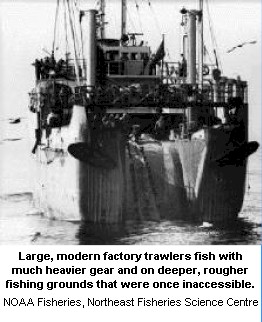
January 24, 2005
1/24 - Florida Ponders: "What's a beach?"
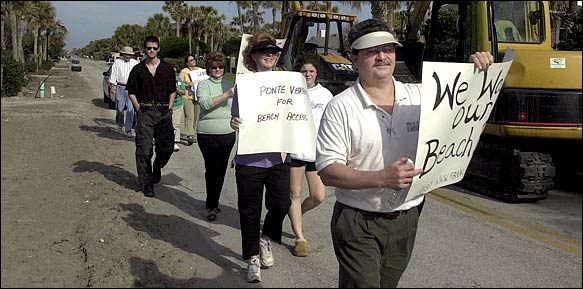
Over 60% of Florida beaches are private with no public access.
January 23, 2005
1/23 - Ink: S.L.O. Tribune Reports on SB Filming of Fishermen
Coming soon to this website (around Feb. 1): "Rebuttal to the Tiny Fish PSA: The fishermen reply" (a 5 minute video). In the meanwhile, take a look at the story about the filming in the San Luis Obispo Tribune.
January 21, 2005
1/21 - California Fishermen: Have they "suffered enough"?
Just got back from 2 days in Central California interviewing fishermen for a 5 minute video we are putting together titled, "Rebuttal to the Tiny Fish PSA." It will be a glimpse of fishermen's response, in their own words, to having seen the Tiny Fish PSA on their televisions (and yes, I managed to survive my encounters with them without any physical harm).
One thing I can tell you right off the bat, there is an enormous amount of anger and frustration among every fisherman I have spoken with in the Central California coast over the past two weeks, which is probably about 25 fishermen now. Every one of them. Does it have to be that bad? That's the question we are pondering. The new video will be ready in a couple of weeks or so and will be posted on the website.
In the meanwhile, here's an article in the LA Times yesterday from veteran ocean writer Ken Weiss, about another troubled California fishery. It quotes the California state Fish and Game president who told authorities at a sentencing hearing for a fisherman friend whom he said had, "suffered enough."
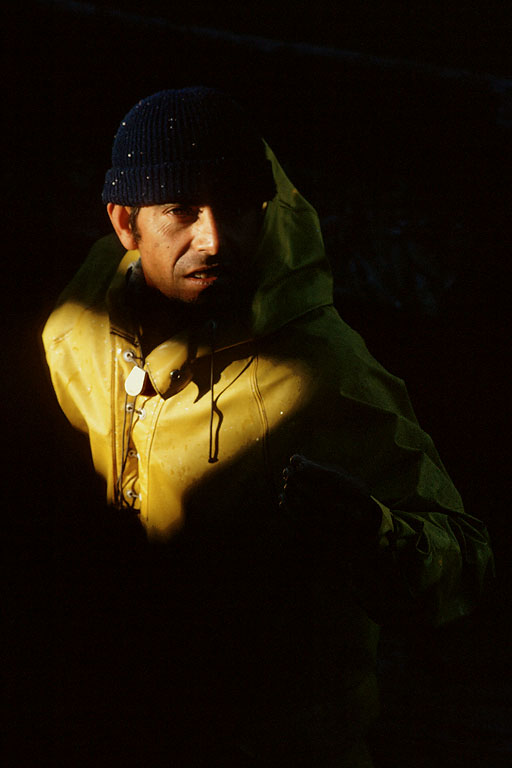
Monterey Fisherman, 1973 (photo by Bill Hocker)
January 18, 2005
1/18 - THE MPAs DEBATE: A pro and con discussion
One of the fishermen I communicated with last week sent me this excellent article from the November, 2003 issue of Frontiers in Ecology. It presents six top marine scientists discussing the pros and cons of MPAs as a management tool. It all comes down to a choice between "Scientific Imprecision vs. Precautionary Management." Take your pick. Do you think its better to not implement MPAs because of the imprecision of the science that accompanies the concept, or is it better to go ahead and implement them out of precautionary concern. Certainly the latter is the better option ... if you're not concerned about affecting the livelihood and sport of fishermen.
January 17, 2005
1/17 - Enviro Critic Feeding Frenzy: Adam Werbach's unconvincing essay
Okay, I'm as eager as the next person when it comes to beating up on the poor old environmental movement, but Adam Werbach's essay, "Is Environmentalism Dead?" is inept and useless. Aside from the fact that Mark Dowie said all that needs to be said about enviro problems back in 1995 with "Losing Ground" (and he said it with a writing style that wins awards), Werbach's overly dramatic writing eventually leads to a bunch of silly, overly-simplistic "we need to start everything from scratch" suggestions that are no help at all.
And on page 23 of his essay he says, "The problem is not our failure to communicate." Say, what? Yes, it is. Effective communication results in persuasion. And this is the biggest problem of the environmental movement -- the failure to persuade anyone other than "them who art already persuaded" (i.e. the PBS crowd).
I suppose I should have read his essay before posting it a couple of days ago. Oh, well. What is so good about Mark Dowie's book is that he addresses the socio-economic elements at work in environmental conflicts. There are elements of basic class struggle, with affluent city folk trying to impose their will on working class country folk in many instances. This is a complex problem, and requires a lot more depth than Werbach's speech which he seems to feel was historic.
And for more on this whole issue, take a look at the article on Salon, titled, "Dead Movement Walking?" It's turning into a feeding frenzy of enviro critics. So much that it's no longer feeling cool to criticize the big organizations.

Enviro criticus, the Common North American Environmental Critic
January 14, 2005
1/14 - Divers Discuss "shifting baselines": Check out the discussion on scubaboard.com
When we first started this website we received a number of great personal accounts of shifting baselines examples, some of which we posted under SB STORIES. I've received lots more but never gotten around to adding them to that feature. But here's a great one today that was posted on a forum at the diver's website, Scubaboard, where they are having a very in-depth discussion of shifting baselines as it applies to the world of diving.
____________________________
It is very easy to be tricked into believing that the current state of an environment is how it is supposed to be. I have been aware of the "Shifting Baselines" problem since my college days but I haven't had a name for it till now. Back then we used to go backpacking in the Southern Appalachians of the US five or six times per year and we alway tried to go to the areas designated as official Wilderness in order to see the best forests.
One year my buddy suggested we go to a place called Joyce Kilmer Memorial Forest in North Carolina. He said it had never been logged and therefore was better. The difference could not have been more obvious. Joyce Kilmer is a small pocket of Eastern old growth forest and the trees are gigantic. Oaks have trunks up to 10 feet in diamter that punch right up through the canopy so that we could not even see their branches. At that point we knew we had been duped. Hiking all those years in "Wilderness" that was nothing more than sterile third growth tree farms.
Last year we went to Belize to dive the reefs and hike the rain forest preserves. We dove for several days before my wife pointed out that virtually all the coral were dead. I was so excited to be diving that I did not even notice that the large spherical rocks used to be brain coral and the weird vertical rocks used to be columnar coral. Of course the dive operators are not going to say anything about dead coral and the divers don't want to be rude by mentioning it.
After a week of diving we went into the mainland to visit Cockscomb Basin Wildlife Sanctuary. It is an extremely well run preserve sheltering jaguars and howler monkeys but it was all clearcut by the British before creation of the sanctuary. We were left wondering what a real climax tropical rainforest would be. My understanding is that this is true of the entire country of Belize. The British cut and exported all the tropical hardwoods and then said "you can have your country back now - here's your independence".
Anyway, keep up the good work. We are learning, even if a little too late.
Pete Dudley
Albuquerque, New Mexico, USA
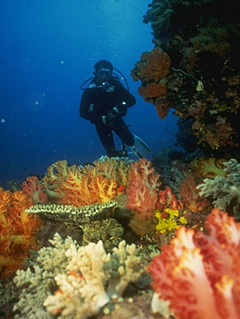
Veteran underwater cinematographer Howard Hall always referred to
"shifting baselines" as "ten year syndrome" (your favorite dive spot
looks different when you come back ten years later)
1/14 - A Good Discussion of MPAs: Skip down to 1/7
Hate to see a good discussion get left behind. Jump down to the 1/7 item on "Are Fishermen Crazy?" and check out the comments. It's an illustration of the complexity of the MPAs issue, particularly among recreational fishermen.
January 13, 2005
1/13 - What you should know about "Environmentalism" and its current ailments
As I took my tongue lashings from the fishermen last weekend I kept thinking, "How am I supposed to defend environmentalism given how sick the movement is?"
And it is ill. Since Mark Dowie's landmark book, "Losing Ground,” in 1995 there has been a spate of books not only criticizing the environmental movement from outside (like Bjorn Lomborg's blockheaded “The Skeptical Environmentalist”), but plenty of major, major ecologists with the very best credentials (like John Terborgh and James Gustave Speth) expressing pessimism for a movement that clearly peaked in the 70's and has been losing its way ever since.
Jason Lefkowitz was talking about it on the Oceana Blog a couple of days ago. Its definitely in the air. I received a number of essays last month criticizing environmentalism from all different sides. As Jason points out, there is a parallel with the unraveling of the Democratic party. And here is a speech by Adam Werbach on, "Is Environmentalism Dead?".
All of which hopefully provides me with a little bit of defense when I occasionally say things that are critical of environmentalism (and end up getting attacked as a traitor by thin-skinned enviros).

January 12, 2005
1/12 - FLUSHING THE L.A. TOILET: Heavy rains make coastal waters filthy
It just goes on and on. Chad Nelson of partner group Surfrider called my attention to this article in today's LA Times with an e-mail labeled, "Business As Usual." Sad, but true.

A view of Los Angeles from the ocean.
1/12 - Anybody Listening: OpEd #2,438 on "Our Oceans are in Crisis"
If I had the time and energy I'd like to do some random polling of people on the street, asking them to, "List the top five crises of today." Let's see ... what do you think they would go with? Definitely terrorism and tsunami. Probably education. Probably gas prices. Maybe gay marriage (clearly an American identity crisis). What else? Definitely the AIDS crisis. The jobs crisis. The Janet Jackson breast crisis (seriously, its indicative of the moral values crisis).
After they got through about ten crises, most of which would probably be based on phrases they had heard repeatedly on the evening news, they would probably look at me and say, "okay, so what are you looking to hear?" And I'd say, "um ... the ocean crisis?" And they would say, "Huh?"
Yet, here, once again, is another OpEd published today in the San Jose Mercury that states, verbatim, "Our oceans are in crisis." This one is from Leon Panetta (head of the Pew Ocean Commission) and Andy Sharpless (head of Oceana). They're doing what they can. Its just sad. Either there is or there isn't an ocean crisis. If there is, there ought to be some sense of urgency being conveyed to the public through effective mass media (which means television). But there ain't.
I remember hearing from a number of major ocean conservation folks, three years ago when I first entered into this world, that they felt, "you shouldn't alarm the public about a problem that they can't do something themselves to solve." So much strange logic. And so few people in the public thinking the oceans are in crisis. And such a hard case to make when everyone going to the beach sees no evidence of it and finds plenty of fish in their stores. But that is what mass media is supposed to be for -- to help people see what is not
confronting them every day.
(and p.s. - I hate to be a skeptic, but are we really, really sure that North Atlantic right whales are in crisis? This OpEd opens by listing them as part of the evidence of the ocean crisis, but I remember 25 years ago teaching in Boston and lecturing on the fact that there were only a couple hundred of them left, which is still the size of the population, if not larger. I'm just asking, are we really, really sure that meets the definition of a crisis?)
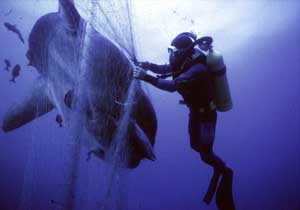
Der crisis? Ya or nein?
January 11, 2005
1/11 - Commentary from a California Fisherman
One of the best things to come out of last weekend's dialogue with fishermen has been some very good e-mails. Here is one that arrived this morning. Please take a minute to listen to this fisherman from the California coast.
FROM A FISHERMAN:
Guess I just don’t know who to say Hi to. You won’t get any angry tirade out of me, quite the contrary. There are many things we can agree on. We agree our fish stocks are being depleted, and that something must be done about it. What we probably don’t agree on is what method to use in correcting the situation. The act of fishing for commercial and recreational purposes have taken place for as long as history has been recorded. My main reason for this letter is simply to create some dialog between two segments of our society that understand things from a different point of view but have a sincere desire to correct the problem. I feel both entities can work together and be very successful.
You may have already guessed I am a fisherman. What you may possibly not realize is most fishermen like myself have a deep respect for our natural resources and their sustainability. People like myself will do all they can to return fish to their habitat unharmed if it is a fish that is not wanted, not needed, or is a protected species.
You may be aware of the following but in case you are not I will share the main reasons for our depleted fish stocks as I see it.
1. Trawlers that throw back more dead by catch than sport fishermen will kill in a lifetime.
2. Destruction of habitat by commercial fishing.
3. Pollution from over population.
4. Water that is needed to sustain fish fry and juveniles in our rivers, bays, and ocean is being pumped out for other purposes. The massive pumps kill millions of fry each year.
5. Our California Dept. of Fish and Game Commission has approved a smaller mesh size for the commercial Herring fishermen’s nets in the S.F. Bay when their own scientists told them not to approve the change. These Herring are being used to feed farm raised Salmon and Tuna. This is the bottom of the food chain in our ocean’s eco system. These Herring have shown they cannot sustain themselves under the prior regulation. How are they to survive if commercials are allowed to net smaller and smaller Herring? If you remove enough Herring from the food chain the sustainability of most of our ocean’s fish will be suspect. Nature governs propagation of itself based on food supply and habitat. If you remove or change either of these there is an immediate reaction from what depends on them for survival.
6. MPA’s (Marine Protected Areas). These, in my honest opinion, absolutely are not needed and will create a host of other problems. MPA’s will not have any effect on pelagic fish such as Salmon and Tuna. Any fish that orientates itself to habitat is already protected by an off limit depth of only 120 feet. Many fish live in depths greater than this. The fish that live within the 120 foot range have proven themselves to be sustainable
under current regulations.
7. These are just some of the major reasons I see that have a negative influence on our fish and none of them can be laid at the feet of the recreational fisherman. I am sure I could provide contacts with others from the fishing community who are much more knowledgeable about these issues and share our mutual concerns. My opinion is if we all work together we can make things happen much faster. That would be the best thing for our natural resources. Thank you very much for taking the time to read this. I most certainly would be interested in your reply.
1/11 - How Deep Is Your Love (of coral reefs)?
Five people sent me this link last week, as if it was banner headline news that the deepest coral reef in the U.S. was "discovered" last month. Is this really news? It was "discovered" by Univ. of S. Florida divers five years ago. And 250 feet is nothing for living corals in the Caribbean. I remember diving with Jeremy Jackson's graduate students in Discovery Bay, Jamaica in 1978 (pre-hurrican Allen) down to 225 feet to collect brachiopods under plate corals, and being able to see live coral plates continuing down for another hundred feet. Back in the days when dives to 225 feet were considered cool, instead of just stupid (another baseline that's shifted).
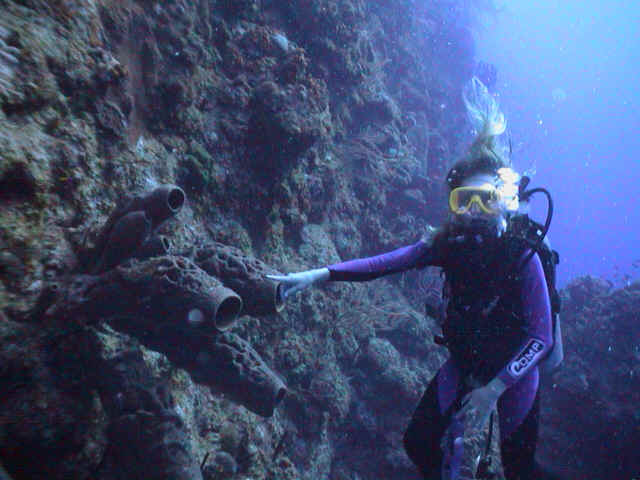
Trials of Life: When sponges attack.
January 10, 2005
1/10 - Fishermen: I hear you
Busy weekend. Spent two solid days trading e-mails and message board posts with fishermen, mostly from the central California coast where the Tiny Fish PSA has been eliciting responses. Also spoke with three fishermen on the phone for a total of a couple of hours. They're not thrilled with the PSA. As expected, just having the letters MPA on the screen is angering, even though the spot is not an endorsement of MPAs. But lots of good things have already come out of the discussions with them.
The first result of this weekend is going to be the addition of a few more resources to the PRO/CON buttons on the MPAs feature, contributed by the fishermen. But probably the most important development over the past week has been making the connections with about a dozen people in the fishing community, including the heads of a few groups, who are open minded and interested in the idea of a little more communication.
More plans are in the works. This isn't a "film and run" project. There's going to be considerable follow-through on the Tiny Fish PSA which was only a tool to open the door for communication, which it has succeeded in doing. Stay tuned.
January 07, 2005
1/7 - Reply from a Fisherman: No, we're not crazy about MPAs
Okay enviros, time to hear from the other side on the MPAs issue, particularly with regard to the Florida study cited in the last item.
The following is from a fisherman, posted on one of the website forums I took part in this past week.
The Florida Fish & Wildlife Conservation Commission (FFWCC) has released a study that seems to refute contentions of some antifishing ``conservation'' groups that no- fishing zones will result in greater overall fish populations and more fish for anglers.
The study, conducted with tagged fish between 1990 and 1999, concludes that ``recapture rates ... suggested that more individual fish may move into the protected habitats than move out.
These data demonstrate that although no-take reserves can protect species form fishing, they may also serve to extract [fish] from surrounding fisheries.''
In short, the reserves, which are being pushed hard by some federal biologists as well as groups that are more or less opposed to all sport fishing, are acting much like no-hunting zones in woodlands; the animals quickly migrate into areas where they can't be harvested, resulting in poorer hunting ashore - and now, it appears, poorer fishing in our waters where more of these no-fishing zones are popping up every year.
In fact, the study indicated that the reserves act as a resource ``sink.'' According to the study, tag recovery around a no-fishing area near Kennedy Space Center, which has been touted as evidence of replenishment from these zones, indicated that 52 percent of tag returns came from inside the zone and only 5 percent from outside the zone, indicating net migrations inward.
To be sure, some areas should be permanently off limits to both commercial and sport fishing. Areas where grouper and snapper congregate to spawn are some of these spots; they represent the fountainhead for most of the fish that supply both fisheries, and killing the goose that lays the golden egg is never a good policy.
The same is true for seasonal closures to prevent fishing on easily targeted aggregations. For instance, the four-month closure of summer snook fishing has worked wonders, eliminating most of the pressure on large schools of fish gathered around the passes.
But the current craze among some federal regulators to paint whole areas of ocean and bay habitat as off-limits is unnecessary. Most species of fish targeted by recreational anglers in Florida are increasing thanks to 20 years of good management by the FFWCC. Yet marine protected zones already block anglers from 29 zones up to several hundred square miles in area, and four more are proposed for Florida waters.
``No-fishing zones should be the last course of action, not the first,'' says Florida Coastal Conservation Association chairman Michael Kennedy. ``Proven management measures are working. There is no reason to go to the extreme of prohibiting fishing in these areas.''
1/7 - Are Fishermen Crazy: The controversial Florida MPA study
I've been spending a lot of time this week trading e-mails and forum posts with fishermen. Some of them are sick of me, but that's okay, it's been very insightful. A lot of interesting communication has come out of it. And like 'em or not, fishermen do have an ability to communicate directly (and at times forcefully) about issues.
One thing that came up in multiple discussions is the Florida study published in Fishery Bulletin last July on movement of sportfish in and out of a no-take zone. Fishermen are citing this study as an indictment of the effectiveness of MPAs.
You should take a few minutes to check it out. Decide for yourself. And post a comment here if you have any thoughts on it.
January 06, 2005
1/6 - Ted Williams in Audubon Magazine: "Alliances depend on communication"
The actual quote is, "... as the NRA has figured out, alliances depend on communication." It's from a very good essay by hunting and fishing writer Ted Williams this month in Audubon Magazine titled, "Guns and Greens." Very relevant to ocean conservation, and in fact opens by pointing to the California Channel Islands MPA as a case study in failed communication. He does a good job of trying to pull people into the middle ground for the sake of more effective communication.
And his reference to the NRA is not new -- the Turning the Tides report, funded by Packard, also chose the NRA as an example of an organization that knows how to get what it wants.
I'll tell you one thing, after trading posts with fishermen on three of their websites over the past week, they are a lot more focused, motivated and eager to communicate than are environmentalists. Right or wrong, they're really good at just getting in there and discussing the issues. I'm afraid it kind of matches the Republican vs. Democrat divide in communications ability.

Ted Williams writes about "Guns and Greens" in Audubon Magazine, mentioning the conflicts over MPAs.
January 05, 2005
1/5 - Dive Training Magazine features "shifting baselines" on January cover
Veteran diver Marty Snyderman has written an excellent feature article on "shifting baselines" for the January issue of Dive Training magazine. Check out the cover below.....
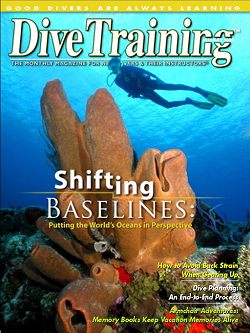
.....and what they have on its flip side, just inside of the cover.
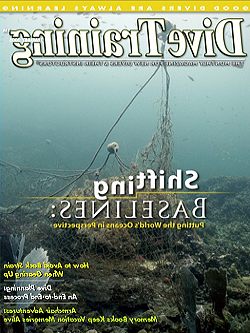
The January issue of Diver Training magazine.
January 04, 2005
1/4 - OPENING STATEMENT FOR 2005: Why is everyone so afraid of fishermen?
ANGRY E-MAILS: Two weeks ago (Dec. 20) our Tiny Fish PSA began airing in Santa Barbara and Santa Monica, California. I first became aware of this when I received a rather strongly worded e-mail from a fisherman (written on Christmas Day!) swearing about MPAs and our PSA. His e-mail closed by saying that he hoped we all, "choke on fruitcake". Lovely. Merry Christmas to you, too.
ANGRY PHONE CALLS: Then, on Monday Dec. 27, I was in the SB office when the phone rang with a call from another enraged fisherman asking who was paying for the commercial. I explained we are an independent "communications project" indirectly supported by 21 partner groups but not really answering to any of them. He replied, "I think what you are doing is irresponsible," and slammed the phone down.
An hour later I got a call from another inquisitive fisherman, but this time I was a little better prepared and managed to engage him in about 15 minutes of conversation. I pointed out that the wording of the PSA is not an endorsement of MPAs, but says only, "Do they work? To find out, visit shiftingbaselines.org." And that on our home page we have the big MPAs button which leads to a DO THEY WORK? button which leads to separate pages for PRO and CON. And the CON page lists the website of all the organizations that we could find who are arguing against MPAs. As always, our belief is that the facts speak for themselves.
More importantly, our job with SB is not to make the case for or against MPAs (yes, we do have an "enviro" slant in that this is a project about halting ocean decline), its only to help overcome a very major current problem which is that the ocean conservation world is hard at work trying to implement plans for MPAs as part of a "solution" to a problem for which virtually none of the general public has any awareness. Which is why the PSA has the letters MPA in very large font size -- in hopes that at least some people, after seeing the spot a couple of times, would begin to wonder, "Well, whut the hell is an MPA?" And this might help attune them to the existing issue.
Anyhow, it turned into a good and civil discussion in which we agreed the communications issue has been a problem.
SUBSTANTIVE INTERNET FORUM: The next day, using our software that tells us where people are linking to our website from, I discovered a fisherman's website that was discussing "the new MPAs commercial" in a forum that already had 20 posts concerning it. Their comments ran the gamut from bellicose to thoughtful. I went ahead and joined the website and made an introductory post, explaining that I am the individual most responsible for the PSA.
What ensued was a very interesting and insightful discussion. You can read the whole exchange here.
Some of the comments were good, some not so good, but WHAT WAS MOST SIGNIFICANT as a pattern was that all of their responses to me began with a "thank you" for taking the time to communicate with them. You can read what you want into that and either be cynical (you're being duped) or interpret it as indicative of the communications problems that exist. Either way, I don't see ANYTHING in the mass media that is attempting to introduce to the mass audience (this means the non-PBS crowd) the concept of MPAs, even though my NMFS friends said to me last spring, "The public might as well start learning about them because, like 'em or not, they're headed their way."
That's my two cents for the new year.
Here's to 2005!
![a_weblogo06[1] (2).jpg](http://shiftingbaselines.org/blog/images/a_weblogo06[1] (2).jpg)
Allcoast Sportfishing: Check out their discussion of the Tiny Fish PSA
January 02, 2005
1/2 - What To Do About the Tsunami Tragedy: Visit the Oceana Blog for Suggestions
Jason Lefkowitz at the Oceana blog, has done a nice job of pulling together a number of useful links in both understanding the current state of the tsunami tragedy and figuring out what you can do to help.
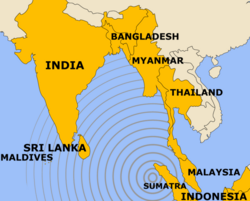
Hard to comprehend.
1/2 - Tsunami Tragedy: damage to coral reefs will be yet another long term cost
The devastation from the tsunami is almost beyond comprehension. And as the authorities keep pointing out, there are many destructive elements that will occur over time such as the spread of disease and the deterioration of the environment, which appears inevitable for coral reefs.
Dr. Jeremy Jackson, co-founder of Shifting Baselines, is quoted in this article in the LA Times, about the devastating effects of the Indian Ocean tsunami -- not only on the human populations but on the coral reefs as well, which will be yet another long term cost to the region.
